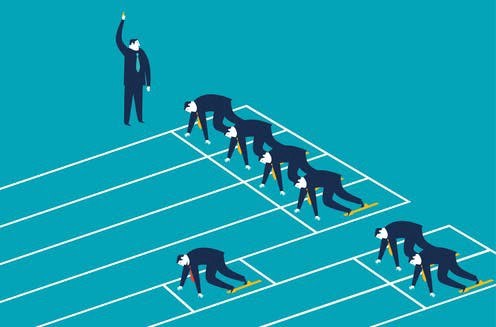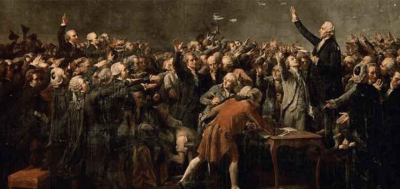Have you ever tried to ask what kind of problem different cryptocurrency projects actually solve? Perhaps we could further generalize the question to what decentralization is actually addressing. Cardano strives to become a social and financial operating system for people who don’t have one. Let’s take a look at what it means.
We look at the topic from the perspective of users and benefits for them. We will not talk too much about technical details, but rather about the possible impact of Cardano on society. Let’s try to answer the question of what problems Cardano is trying to solve.

Decentralization matters
Many people cannot explain the concept of decentralization well and do not know what it can bring to us. We have already explained decentralization in our previous article. We do not want to explain it again. In the article, we will discuss the impact of decentralization.
Perhaps people do not need to know all the technical details associated with decentralization. Projects or services need to offer new opportunities that are in some way better than the existing ones. Cardano intends to become a global infrastructure that virtually all people in the world can use on equal terms. Through decentralized systems, we want to replace traditional services, especially financial ones. Decentralization is primarily about the distribution of power among many participants in the network consensus. This principle is then transformed into a particular advantage for the user. The distribution of power must ensure that there are no centers that may abuse their position.
Decentralization is necessary not only against the enemy from the outside but above all against the emergence of centers of power within the system itself. As the network becomes more important or there are some serious problems, participants need to agree on a solution that will be beneficial for most of them. The growing importance of the network also increases opportunities to profit financially for a few players from the inside of the system. With a growing user base, competition has been pushed out, and a dominant position in the market makes it possible to raise fees or abuse power. If the system allows the emergence of centers of power, sooner or later there will be efforts of individuals to seize this position for their benefit.
If the network is not fully decentralized, some of these problems may arise:
- Users face some technical issues with the network but it is not possible to agree on changes in the protocol for any reason. The problem is not solved for a long time and the network can be split into two different projects. The team behind the newly created project will try to solve the problem, the old network will remain as it is. This solution is very unfortunate from the point of view of users because it basically means that they will have to decide which network to use. The user base is divided. Moreover, some developers could leave the old project to work on the new one. Trust in the network itself can suffer. Technical problems must be addressed.
- An unexpected center of power may arise that authoritatively decides how to solve some problem. This option requires a really strong position in the system on the network consensus level. For decentralized networks, this is an unexpected event. Individuals should not have the power to make decisions and enforce them. They can only have an opinion and make a proposal for change. Some kind of voting should follow.
- The network might not be sufficiently decentralized and some less decentralized part of it becomes a new center of power. Unlike the previous point, we are not talking about power at the level of network consensus, but about poor decentralization elsewhere, where individuals can change some settings or conditions for using the network. We point to attempts to address the scalability issue through often centralized second layers. These attempts are likely to fail because centralization has historically always failed.
Proper decentralization is a prerequisite for the replacement of traditional systems. The system that aims to replace traditional systems must be well decentralized at the level of network consensus, must not slip into centralized solutions to solve difficult network issues, and must somehow ensure that technical problems are resolved in a timely and good manner. Users will not massively adopt a network that is not working well and cannot solve problems quickly.

Striving for high-quality decentralization and meet user expectations is a major goal in itself. Cryptocurrency adoption will generally be difficult for many reasons. If the project wants to offer the world a better-decentralized service, it must be able to do what traditional services offer and remain decentralized. The only high-quality decentralized solution yields the benefits that traditional centralized services cannot offer. People will only appreciate and use the decentralized system if individuals do not dictate the conditions to the majority and do not abuse the position. Therefore, the project must not fail in the first place in decentralization. A centralized blockchain (private blockchains), or poorly decentralized one, does not offer many advantages over what we have today.
Delivery of long-term sustainable decentralized networks is still a challenge. Attempts to create a decentralized network have so far mostly failed. We saw a lot of project forks just because the team was unable to agree on technical changes needed to solve critical issues. That’s why we have, for example, Bitcoin and Bitcoin Cash. We have seen a lot of hot debates before and even after the fork. Users want to see constructive dialogue, or at best they don’t want to know about network problems at all. Decentralization at the project management level is still an unresolved topic, although some attempts are ongoing.
We saw an attempt to introduce a tax on the Bitcoin Cash project. The tax should be collected to solve the problem of developer financing. The dominant pool operators agreed that all pool operators would have to pay tax. If smaller operators do not obey, the large ones will punish them by not accept blocks mined by them. This basically means that smaller operators will not get a reward. Large pool operators thus exercised their dominant position in the network. How is that possible? For all PoW projects, there are no more than 10 entities that have the privilege to decide which block to follow and have the hash-rate power to enforce this choice. As you can see, one gap in decentralization and strong players will immediately exploit it to their advantage.
Do you think that fees on the second layer solutions will remain cheap if they are extremely expensive on the first layers? Probably not if individuals decide centrally about the size of fees. It is naive to think that someone will not use their dominant position or power for the good of the majority. In addition, the centralized solution represents a single point of failure. The second layers are not in principle bad, but it is necessary to always strive for the best possible decentralization.
Social and financial interactions
Our lives are interconnected with our surroundings and are interwoven with social and financial ties. All these ties involve trust. Strong trust is within family and friends. However, people often have to interact with their surroundings and there may be enough trust missing. You may be communicating with someone you don’t trust at all. Still, you need to make sure the interaction works well, and someone doesn’t steal your money or get you into trouble.
Our ties are increasingly digitizing and also globalizing. We travel much more and conclude international agreements. Shaking hands is no longer enough to gain confidence. We often interact with someone on the other side of the world and physical contact is not possible. Today is fast and time is money. Trust is basically a simple thing. Everyone wants to rely on the counterparty to do exactly what you agreed on. Breach of trust often results in financial losses or other difficulties. To build trust, we need to have positive past experiences with someone. We are often willing to trust someone trusted by our good friends. We often have to trust, because the actor has a dominant position and is used by everyone. The traditional business world seeks to secure trust through complex contracts and the legal system. However, in the digital world, this is a very inefficient, complex, slow, and expensive solution.
Essentially, creating a contract means shifting confidence to a third party, namely the bank and the legal system. This has been working for a long time, but it slowly ceases to serve us well. Blockchain is generally very good at ensuring trust among participants. Therefore, Cardano seeks to embrace this space and become a platform that will provide trust between the parties concluding an agreement, trade, or make business between each other, transferring assets, and so on.
As you will see later in our article, the horizons of distributed networks can be very broad as related to usage. Trust is needed almost everywhere you look. We often lack confidence in our own legal system, tax office, or state. If we have a problem with something, it is logical to look for a solution and somehow fix it. Cardano, as a trust-machine, can greatly help in this effort.

How can decentralization help to make the world a better place for living
The Internet has essentially connected the world at the information and communication level. A person in the middle of the desert can have the same information as students at renowned universities. You can send a text message to anyone in the world in a second. The Internet has globalized the world and distributed networks are just a continuation of this phenomenon. As a result, we don’t have to think about things at the community, state, or continent level. We can solve things globally if it makes sense in a given context, but we lack the right tools to do this. When I ask you about the services you use on the Internet every day, you name a few large global companies like Google, Facebook, Twitter, or Amazon. Here, globalization has already taken place. But it has one catch. These companies abuse their dominant position. The services of companies are very good for communication. However, these companies will never be 100% trusted. There is still great potential for improvement.
Let’s take a look at Uber. This company managed to globalize the business, which used to be exclusively local. Uber connects those interested in a ride with “taxi drivers” and reduced travel costs by 20 to 50% for users. However, Uber charges users for connecting them with drivers and generates large profits every year. When you think about it, all Uber does is linking demand with supply. Uber has done a lot of good work to build his position and users benefit from using the service since they pay less for the taxi. However, companies like Uber are just middlemen who will eventually gain a dominant position and start to abuse it. They start charging higher fees or selling user data. Over time, the services provided will become unfair to users in some way. This problem always occurs when something is centralized. Over time, someone stops thinking about users and is looking for their own profit. Thanks to its dominant position, it may be difficult, if not impossible, for competitors to gain a larger market share. We have just defined a problem. The problem is a centralized middleman.

Uber, of course, has competition, so he is economically forced to keep charges low. Fees are often a reflection of how large a company is and how big market share it has. It is a question whether there is a place for competitors. Cost reduction is often about automating processes. Once a competitive solution is cheaper or otherwise more advantageous, those interested in a similar service can migrate to it. Many customers and taxi drivers use Uber. People will not start massively using a decentralized service simply because it exists. The decentralized competitor will have to compete for customers through marketing and it costs money. But this is not a task for Cardano. This is up to the entrepreneurs who want to use the platform and offer better solutions to people.
Cardano intends to create a platform that will allow us to get rid of these middlemen. The platform could facilitate the linking of demand and supply, producers and consumers, and establish trust between participants. Cardano can automate financial processes through smart contracts. Users often need middlemen simply because they do not know each other and thus do not trust each other. New technologies could ensure trust between people who do not know each other. A pure decentralized transaction network can do a lot of work but possibilities are limited. The decentralized transaction network itself is able to replace part of the functionality that banks provide but it is not able to establish trust between participants that do not know each other. Let’s have a look at what exactly Uber does from the point of trust.
In the case of Uber, users and taxi drivers trust the company. Users pay for the service and Uber pays to taxi drivers and take a profit. Users have to pay to taxi drivers and something extra to Uber that represents the trusted party. Technically users pay for trust so they pay to the middleman. A decentralized network could make the same job. As you can see, it is not sufficient to replace just a part of the functionality that banks (or other services dealing with money transfer) provide for Uber. Taxi drivers and customers still have to trust to Uber since Uber initiates money transfers and keeps user personal data. We can go further in replacing the functionalities and services of middlemen in a lot of other places.
Using decentralized services must have some significant advantages to be adopted. Let’s have a look at it:
- Users can be sure that nobody will misuse their personal data. Without central authority and with appropriate privacy on the network level, the service based on Cardano could be completely private. Even if Uber started accepting cryptocurrencies as a method of payment it would still control user data.
- Users could pay less for trust. Of course, some profit has to be always paid to reward creators of a service. However, it could be significantly less and it could be more transparent since users will see how much takes taxi drivers and how much is paid for the service. Generally speaking, we can see a lot of examples when people are not paid fairly for their jobs. Buyers of goods often just pay without bothering how much takes the middleman and how much is given to producers. Middlemen often take a large part of the price for goods. Transparency could ensure fairness.
- Users could better control the conditions of the contracts. Traditional contracts are very complex and are written in the language of lawyers. Contracts often contain all possible development scenarios and what they imply for both parties. Moreover, users often do not want to read terms and conditions when using an internet service. A smart contract can very well serve as an escrow account and transfer assets only when both parties provide them for transfer and fulfill all conditions. Smart contracts can be very simple and terms very clearly defined for both parties. Writing contracts as a program can take us back from complexity to simplicity. Source code will always be hardly understandable by the majority of peoples. However, we can simplify it as much as possible or use a kind of standard templates for usual contracts like lending money, swapping assets, bets, insurance, crowdfunding, buying goods from the internet, paying taxes, paying continuously while using some services, etc. It will take some time for people to trust smart contracts and learn how to use them. We believe, that smart contracts will form the backbone of all Internet services.
- Once the agreement is concluded, no one can change the conditions unexpectedly during the process. Some agreements are concluded for a longer period of time. Banks often tend to change conditions to the detriment of the counterparty. Smart contracts technically prevent such unfair behavior.
- Many of the benefits stem from using a distributed network: 24x7 service availability, speed of the service, reliability, security, censorship-resistance.
- There is little discussion about the global reach of decentralized services and the potential impact on global trade and business. Are you, as a retailer, interested in buying coffee directly from an African producer at a fair price? Have you ever thought of this option? In western countries, we usually buy coffee directly from some middleman. What if the retailer had a chance to buy coffee at a fair price directly from the producer and then sell it with a small margin in the shop? The unnecessary and expensive middleman who would buy coffee from the farmers cheaply and then sell it to you for a bunch of money would be omitted from the process. Moreover, your customers could ensure that farmers were fairly paid, and also you take a fair profit. We talk again about transparency. Some people may not like transparency, but others may use it for their own benefit. The use of new technologies will also require a transformation of society.

From time to time we can hear that smart contracts have been created and are now looking for a problem they would actually solve. As you saw in our example, there are many possibilities for using smart contracts since there are a lot of middlemen. We need to replace or transform the services, not only the underlying transaction system. Moreover, we did not cover all the possibilities. For example, to vote internationally on global issues, or locally about some problem within a city. Some possibilities for future use are yet to come. As we have seen, the transaction system itself will not ensure trust in all cases. For example when you buy goods from the internet.
If you pay by cryptocurrencies in a store today, you give your crypto to a third party and she gives you a credit card. You pay by card in a store and the merchant gets fiat from the third party. A third party will later subtract a portion of the crypto via a slow transaction. Is this decentralized and are your personal data protected? Yet another example. If you are to enter into a paper contract and agree to pay via crypto, you trust the third party to resolve any problem. Yo trust the legal system. A smart contract can prevent problems and even more ensure privacy. In other words, smart contracts are able, to some extent, replace or supply the legal system. So again, you have a better option.
We have the technology, now it’s all about adoption.
Summary
As you can see, distributed networks can offer many new possibilities and completely change the world if we will want to change it. In our view, it is only a matter of time before this happens. We have good direction. Now we just need to continue in our efforts. The list of possibilities is basically infinite. As developers learn how to take advantage of Cardano, we’ll see many new and exciting applications. People will trust the network and smart contracts sooner or later.
The digitalization of national currencies can only help to Cardano if they can be used within smart contracts in a trusted way. There is no point in fearing digital national currencies. Cardano is not necessarily here to replace national currencies. It is possible to use them, or it is also possible to use something else if people decide to use it. First of all, Cardano wants to replace the middlemen we don’t need. Not the national currencies. We do not replace national currencies if we do not have the appropriate technology to do so. The transaction system itself will not replace banks, so probably not even money.
It makes no sense to use distributed networks only for transactions and continue using traditional services, where owners and administrators retain much power and control. Cardano is here to become a social and financial operating system. It is there to ensure trust among all those who need it and to build new services on a fairer basis and distributed power.
Source: Cardano intends to be a Social and Financial Operating System
 Cardano empowers individuals
Cardano empowers individuals Explaining Cardano's eUTXO model for a five-year-old
Explaining Cardano's eUTXO model for a five-year-old Cardano does not need PayPal
Cardano does not need PayPal How to Swap tokens on SundaeSwap
How to Swap tokens on SundaeSwap